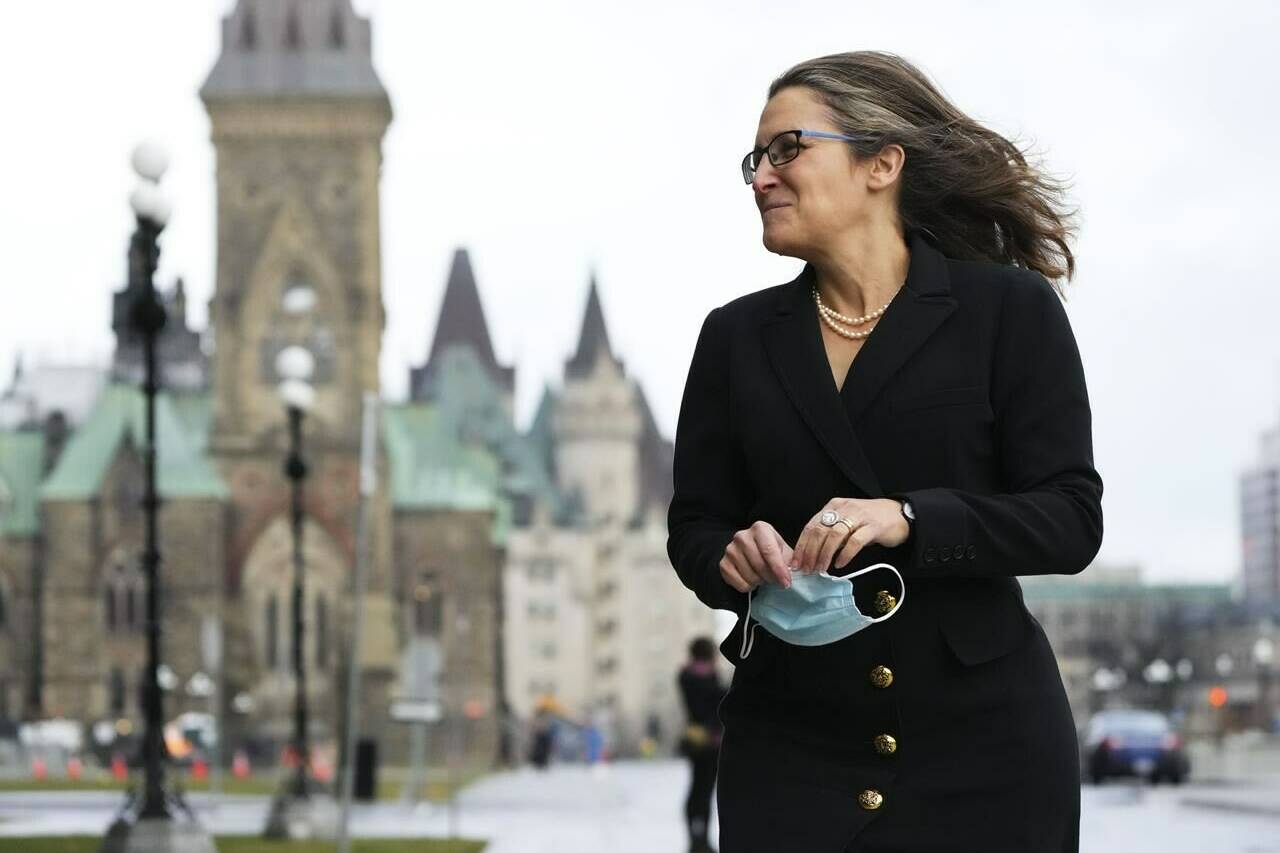Opposition MPs are getting ready to review the Liberals’ latest package of pandemic aid and grill Finance Minister Chrystia Freeland about myriad economic issues.
The 12-member House of Commons finance committee is scheduled to meet Monday to move the aid bill closer to a final vote before MPs leave on their holiday break in two weeks’ time.
As part of a compromise to fast-track the legislation, the Liberals agreed to have Freeland sit for at least two hours of questioning before the committee.
That gives opposition members a chance to grill Freeland about issues facing the domestic economy and the government’s pandemic response overall.
NDP finance critic Daniel Blaikie, who is on the committee, says he plans to press Freeland on ways to reverse clawbacks for income-tested benefits to low-income seniors and families whose earnings were buoyed by emergency aid.
The New Democrat adds that his party has concerns about how only workers subject to lockdowns would receive income support, leaving out thousands still struggling.
“The Liberals talk about a recovery that leaves no one behind, but that’s not what their bill does,” Blaikie said.
“While inflation rates rise higher and Canadians struggle to afford housing and necessities like groceries or medication, the bill proposed by the government shows that the Liberals are choosing to let vulnerable Canadians fall through the cracks.”
Inflation is also likely to be on the minds of Conservative MPs on the committee as the party tries to pin the problem on the government, despite pressures coming from a variety of global factors, including supply-chain issues.
MPs on the committee will have to decide when Freeland testifies as part of the review of the bill, but her office said Sunday the government is looking for swift action from the committee.
“We urge all parties and all parliamentarians to work with us to quickly pass this legislation and get this support to Canadians without delay,” said Freeland spokeswoman Adrienne Vaupshas.
The bill before the committee proposes a $7.4-billion revamp of benefits to send them only to workers subject to lockdowns, and rent and wage subsidies for only the most hard-hit businesses through to May 7.
Benefits for parents who must stay home with sick children, and another for workers who need sick days from work, would also be extended to the spring.
The Liberals argue broad income-support measures and business aid are no longer required given the strength of the economic recovery to date.
The latest figures from Statistics Canada showed the economy grew at an annual rate of 5.4 per cent in the third quarter of the year, just a hair below what the Bank of Canada expected.
Friday’s jobs report also showed gangbuster growth in November, as the addition of 154,000 jobs in the month dropped the unemployment rate to its lowest level since COVID-19 first struck the country, and within 0.3 percentage points of the levels recorded pre-pandemic in February 2020.
But underneath those numbers are pockets of weakness in sectors like hospitality and tourism, as well as an undercurrent of uncertainty from COVID-19 itself, including new variants.
“People need to know that if another lockdown is imminent, or if they need to stay home because they’re sick … that there is stability there from income support,” Unifor economist Kaylie Tiessen said Friday.
“That has been a really important piece of getting us through this crisis less battered than we otherwise would have been.”
Meanwhile, the Liberals are scheduled to introduce a bill that would revive a previous legislative push to repeal mandatory minimum penalties for drug offences.
The government on Friday gave the House of Commons a procedural heads-up that a bill to amend the Criminal Code and federal drug laws would be introduced on Monday.
READ MORE: Liberals introduce bill with targeted pandemic aid for businesses, workers
Jordan Press, The Canadian Press

